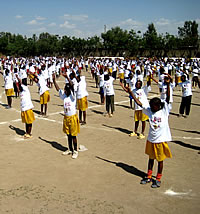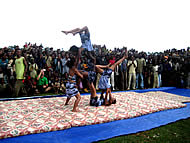
Photos courtesy of One Love
by Joanna Klonsky
AWASSA, ETHIOPIA—People joke about running away to join the circus. David Schein hadn’t exactly planned for it. But here he was, surrounded by a crowd of 2,000 in the middle of the town market in Awassa, Ethiopia, helping orchestrate the first public performance of the One Love AIDS Education Circus.
Schein, now the executive director of the Arts Council for Chautauqua County, New York, is the former executive director of Free Street Programs, a youth theater organization in Chicago. When a friend told him about a troupe of kids doing gymnastics in the street in Awassa and winning local competitions, he decided to go check it out for himself.
 “I went over there and worked with these kids,” Schein says. “I kind of parachuted into a whole other planet.” When he met the group, he was surprised. “They were a troupe. They knew how to warm up, they rehearsed, they had all this common language with me,” he says. “They spoke the language of theater, and that was maybe the biggest exhilaration for me— that I found that you could go into a really different, foreign place and do the same stuff you do in Chicago.”
“I went over there and worked with these kids,” Schein says. “I kind of parachuted into a whole other planet.” When he met the group, he was surprised. “They were a troupe. They knew how to warm up, they rehearsed, they had all this common language with me,” he says. “They spoke the language of theater, and that was maybe the biggest exhilaration for me— that I found that you could go into a really different, foreign place and do the same stuff you do in Chicago.”
Schein helped the crew create a show about AIDS. “The kids were physically really brilliant. They were really good gymnasts. Really tough. We worked outside, sometimes in mud puddles, sometimes on gravel, and the kids were barefoot.”
After that first showing of the AIDS education circus, Schein says, “I went and bought a sheep and a whole lot of orange Fanta” for the group. Then he went back to Chicago to raise money. He formed a non-profit organization in the United States, called the Awassa Children’s Project, dedicated to supporting the young performers in Awassa.
From Circus to Support Network
Nearly a decade later, the street performance group has transformed into a multi-pronged youth service organization. And it’s having a major impact on the quality of life for young people in Awassa.
“We got some money from the circus for food,” says Tesfaye Tekelu, 22, an original member of the troupe. “After we founded the organization, we started getting food once or twice a week. It began growing up and we started eating the whole week.”
One Love Statistic
Blog post 4/17/09 by gReEtInGs...
Last Saturday One Love Theater took the stage, well grass, at a market located about 25 km from Awassa. What ensued was approximately 65% of a performance. Due to the rain and simply too many people the show was, unfortunately, cut a bit short. Still the 2,000+ audience was treated to One Love at their finest. The overzealous crowd was a testament to the role of art as universal communicator, once again far transcending the costly, yet popular method of people behind desks cranking out statistics that will be used for more people behind more desks. If you were to take the last Saturday's incomplete show as a "statistic" it looked a bit like this...

With funding Schein and others raised, the group created the Awassa Children’s Center, where some 60 kids, mostly AIDS orphans, now reside.
The group also created the Awassa Youth Campus, a center where local kids can participate in the One Love Theater AIDS Education program, take aikido classes, play basketball, and study in the library, among other extracurricular activities.
“There was no place for the youth to go and hang out,” says Tekelu, now the Youth Campus’ project director. “If you wanted to do music, art, if you had interest to do these things, they didn’t have any place to go and try that.”
Spreading Awareness
Still, Tekelu says, One Love remains the central focus for youth campus. And the HIV/AIDS awareness shows are getting more and more attention. Every year they tour Ethiopia, where nearly 1.5 million people are infected. They perform in colleges and markets.
“We teach HIV awareness in every village,” he says. The goal, according to the organization’s website, is to make the information accessible and engaging, rather than a recitation of facts and advice.
Last fall, Tekelu and other One Love performers toured the United States, appearing in Chicago, New York, Los Angeles, Rhode Island, Denver and Pittsburgh, among other cities.
The young performers of One Love have also begun maintaining a blog to spread information about their own shows, and to connect with allies around the world.
“What makes one love different and useful is that any children, without any qualification, can join and participate and learn music, art, gymnastics, theater, dance, Aikido,” says Tekelu. “Our goal is to bring creativity and hope to the community through art, and to show all the possibilities for their future.”




